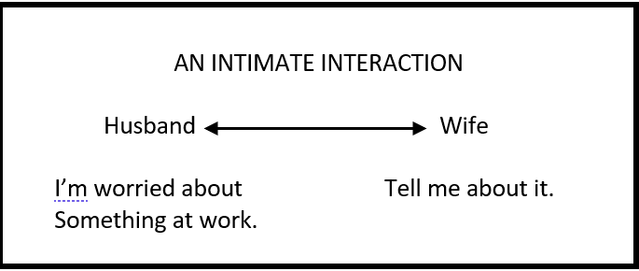Relationships
How to Enhance Intimacy in Your Relationship
What are the components of intimacy?
Posted April 7, 2020 Reviewed by Abigail Fagan
What is intimacy? Is it a feeling, specific actions, non-verbal communication, how physically close you are, a personality trait, or sexual activities?
Intimacy is not a static “thing” that exists in either one of you. It is between you and your partner in your everyday interactions. It is interpersonal!
An Intimate Interpersonal Interaction
Interactions between you and your spouse have a unique quality that makes them intimate.[1] The basic dynamic of an intimate interaction involves one of you disclosing/sharing some part of yourself and your partner attending to that disclosure.
Here is a diagram of this kind of interaction.

In this simple interaction, Lucas discloses a personal worry he has about something important to him. His wife, Sarah, invites further conversation about his concern, thereby, indicating he has her attention. As they continue their discussion, alternately disclosing and paying attention reciprocally, the intimacy between Lucas and Sarah deepens.
This kind of interaction promotes intimacy because:
- One of you reveals something personal about yourself.
- Your partner responds attentively to your disclosure.
- The interaction becomes reciprocal, encouraging more intimacy.
- Intimacy supports self-disclosure and paying attention to each other.
Self-Disclosing and Paying Attention: Secrets to an Intimate Interaction
Lucas wants to tell Sarah something that is bothering him. He wants to disclose something about himself to her. Sidney Jourard was a psychologist who studied self-disclosure in the ’60s and ’70s. [2] He promoted self-disclosure as our being “transparent”—allowing others to see us.
Such self-disclosure may include talking about one’s personal history, important life milestones, past positive or traumatic experiences, past relationships, and fears. Jourard showed that when we share personal feelings, experiences, and thoughts such as these, a bond is created. And, that bond, in turn, increases our wish to self-disclose.
Paying attention is how Sarah responded to Lucas in the diagrammed interaction. She was not being empathetic, understanding, or helpful at that point. She was “just” paying attention. Don’t underestimate the power of attention.
Allison Bonds Shapiro tells us that paying attention is noticing something without trying to change it.[3] When you are paying attention you are not trying to "fix” anything. Attention is patient and attention is kind. There is no rush, no burden, no criticism.
This is the kind of attention Sarah is displaying in her initial response to Lucas’ self-disclosure that he is worried about something at work. She is non-judgmental, taking the time to learn what Lucas is experiencing and what he would like from her. As Lucas and Sarah continue to self-disclose and pay attention to each other, the intimacy of the interaction is enhanced—increasing their relationship bond.
It’s important to note that Sarah is not being empathetic. Empathy is a complex experience. Empathy may mean I can imagine what you must be feeling in a specific situation and it can also mean I can imagine what I would feel like in that situation. To be able to be empathetic in either way, we need to have a dialogue to understand each other. We need to make sure through this dialogue that we understand the other person’s situation. Empathy begins with a self-disclosing and attention-paying interaction.[4]
How We “Digest” These Individual Episodes of Intimacy
Repeated intimate interactions create an intimate relationship. One psychologist described intimate relationships as the “digested” products of our past interactions.[5] A funny but enlightening way to characterize how we “take in,” benefit from, and incorporate the thousands of individual intimate interactions that happen between you and your partner.
Here is the process of “digestion:”
- Every intimate interaction becomes a positive part of our relationship history and contributes to the expectation of future intimate episodes between us.
- A history of intimate interaction increases our commitment to the relationship.
- A sense of “wee-ness” grows out of our intimate interactions.
- Intimate relationships are likely to be recognized by friends and family as have the sense of “wee-ness.”
- The more intimate the relationship, the more likely disclosures of discomfort, disappointment, shared personal or relational difficulties will occur. Such disclosures will contribute to the intimacy in your relationship.
Does Intimacy Matter?
Intimacy is intrinsically rewarding. It means feeling understood, cared for, validated, and closely connected to another person. Here are a few things intimacy is related to:[6]
- It increases caring about another person.
- It fosters self-awareness in self and partner.
- It lowers defenses both partners.
- It reduces self-doubt and self-reproach in both partners.
In Sum
Relationship intimacy is best thought of as an ongoing interpersonal process made up of “digested” intimate interactions, which involve partners revealing important personal aspects of their lives to each other and each being attentive to the other. As each one talks and listens, both learn about themselves and each other—their unique characteristics. Because of this process, you become "close"—both psychologically and often physically: touching, using pet names, intimate tones of voice, perhaps having sex—this is intimacy.
Takeaways
- Intimacy occurs in an interpersonal process between partners; it is not a static thing in either partner.
- An intimate interaction that produces intimacy is a self-disclosing-paying attention dialogue around an event, issue, experience, etc.
- Self-disclosure is about being transparent to others.
- Paying attention is the way to respond to a partner in an intimate interaction.
- Relationship intimacy is the result of “digested” intimate interactions between partners.
References
1. Reis, Harry T. and Phillip Shaver. (1988) “intimacy as an Interpersonal Process.” In S.W. Duck (ed.) Handbook of Personal Relationships. Wiley & Sons.
2. Cateral-Bughao, Athena. “How Self-disclosure Affects People and Their Relationships: Medium.
https://medium.com/@athyna/how-self-disclosure-affects-people-and-their…- d89f580eb678. May 30, 2015.
3. Shapiro, Alison Bonds. “Paying Attention.” Psychology Today. https://www.psychologytoday.com/us/blog/healing-possibility/201007/payi…. July 22, 2010.
4. Segal, Elizabeth A. “Empathy is More than ‘I Hear You.” Psychology Today. https://www.psychologytoday.com/us/blog/social-empathy/201808/empathy-i…. August 02, 2018.
5. Reis and Shaver.
6. Reis and Shaver




